This post contains affiliate links. We may get paid an affiliate commission if you buy something or take an action after clicking one of the links on this web page.
With the weather turning cooler here in Florida, it was high time to get outside and to start tearing into the yard. We had an especially hot and wet summer this year, and the back 40 was taking over the entire house. I wanted to try out something new to tame the jungle, and settled on the Becker BK-9. After acquiring a BK-2 a year ago, I wanted to explore the Ka-Bar / Becker line further. I favor choppers, and quickly landed on their iconic BK-9.
This is a popular knife for Ka-Bar, and for good reason. Designed by Ethan Becker, made in the USA with a 9″ 1095 blade, full tang, and sub $100 price tag, the BK-9 is a lot of knife for the money. It’s a staple in Becker’s lineup and I have waited too long to acquire one. I was curious to see how it would stack up to my trusty Junglas, and also test the knife in its own right.
General Dimensions and Blade Details
The BK-9 has an overall length of 14-3/4″, a 9″ blade, weighs 16.8 ounces (~1lb), and is made in the USA. This is a hefty knife that borders on short sword territory. Your needs from an large outdoor fixed blade will drive whether this is a camp knife, “survival” knife, combat knife, or back yard tool. For me, this has mostly been a back yard tool. There are some invasive ficus trees in our back yard, and despite judicious pruning they continue to grow like weeds. I have used my BK-9 multiple times for limbing, chopping, and preparing wood for camp fires. Those experiences have informed the majority of my opinions on the BK-9.
Dubbed the Combat Bowie, the BK-9 features a long clip point blade. The clip point is no joke. Towards the end of an especially vigorous chopping session, I somehow managed to poke myself in the inner thigh with the tip of the BK-9. The blade only sunk a eighth of an inch, but it opened my leg efficiently, and sent a small stream of blood down my calf. I would not want to be on the business end of this thing. I recommend that you exercise extreme caution in use, as this knife strikes me as a more dangerous than your typical camp knife thanks to the fine tip.
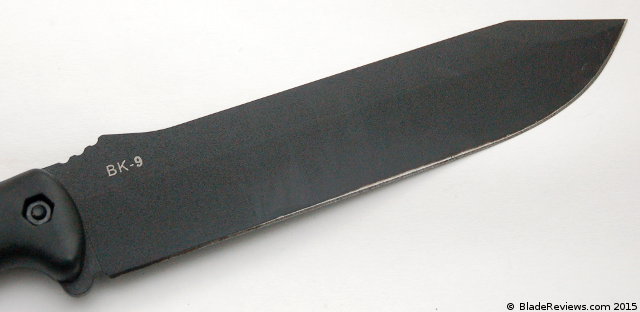
The blade is 3/16″ thick, and has a high flat grind with black powdercoat (although a premium clear-coated version is also available). The powdercoat is thick, and protects the knife from rust. It slowly wears down with use. This knife is not the best slicer, and those hoping to use it to prepare dinner are likely to be disappointed with the performance (it is really too unwieldy for those kinds of jobs anyways). The BK-9 is more at home buried in a tree limb, and it does an admirable job chopping and batoning. Compared to my larger Junglas, I wish it had a little more heft for chopping, but the BK-9 still performs well and it is a lighter package.
The BK-9 comes in 1095 high carbon tool steel. I have written dozens of articles on fixed blade knives in 1095, including reviews of a lot of the ESEE lineup, and of Becker’s own BK-2. So I’m no stranger to the steel. I have come to appreciate its hearty nature.
1095 is ideal for processing wood. It is tough (although it will still chip if you strike a rock with it), and holds a good edge against wood. It is less ideal if you are breaking down boxes, cutting yards of rope, or dealing with other abrasive materials. In those situations, I prefer a good stainless or semi-stainless. Plus 1095 is cheap, and it helps keep the cost down. I’d love a knife like this in 3V, but I wouldn’t want to pay $300 for it. So 1095 strikes a sweet spot for a number of reasons.
I oil my BK-9 down after each use with a little WD-40, and store it in the garage. I haven’t had issues with rust on the blade. A couple of the bolts on the handle have developed a little rust, so don’t make the same mistake I did, and be sure to oil those as well.
Handle and Ergonomics
The BK-9 shares the same handle of the entire Becker line up. This is a proven handle design and is a smart idea. The standard handle material is Ultramid, a high density plastic that has likely been glass reinforced. Micarta scales are also available and this is a popular knife for customization. The Ultramid is tough and attractive with its smooth matte black finish. It’s not the most exotic material in the world, but it’s inexpensive and is well executed here. The scales bolt on to the handle so you can disassemble it for cleaning or to swap on some aftermarket scales. Fit and finish is good. The pieces line up well, and there are no sharp edges to speak of (save the cutting edge).
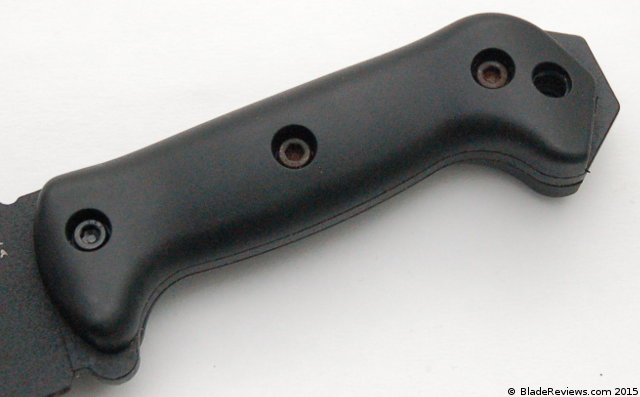
Ergonomics are everything on a tool like this. A poorly designed handle on a chopper is a recipe for blisters and discomfort. Ethan Becker has given the handle a lot of consideration, and it shows. This is a comfortable handle. After extensive use I did not notice any hot spots, and my hands were blister free. I will say that the Ultramid does not offer a ton of texture, and prefer micarta because of the nice grip it provides – even when wet with sweat. While the plastic handled BK-9 never flew out of my hand, I still prefer micarta.
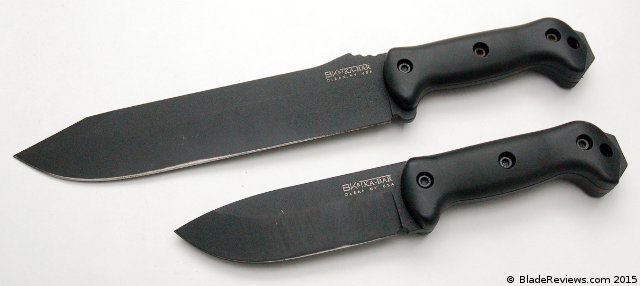
Sheath
The BK-9 comes with a black nylon sheath with a molded kydex insert. I think the sheath is well executed. It’s lightweight, durable, and has thoughtful touches like a belt loop that doesn’t require you to take your belt off to use, and there is a little velcro under the retention strap to hold the strap out of the way of the blade as you draw the knife. These kinds of details are often absent on less expensive nylon sheathes.
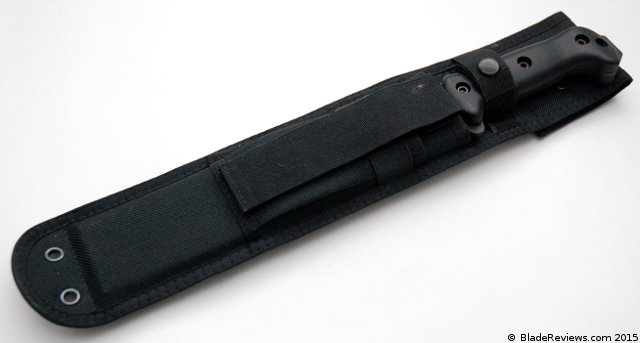
Also, the materials used is of a higher quality. I am not an expert on fabric, but when you compare this with the sheath of the Schrade SCHF9, the difference is immediately apparent. Everything is tighter and of higher quality. There is also an external pouch with a second kydex insert for a small fixed blade, and a pocket for a whetstone (or some other smaller piece of gear). The sheath is fully ambidextrous. The kydex insert does not hold the blade in place with friction alone, but if you engage the snap closure the knife is held securely in place.
While there is a lot to like about the BK-9 sheath, I much prefer the sweet kydex sheath found on my Junglas. Sure, the Junglas is significantly more expensive, but the sheath on that knife is beyond compare. The knife makes such an awesome “thwack!” every time you sheath the blade – it is arguably the most satisfying “knife experience” in my entire collection.
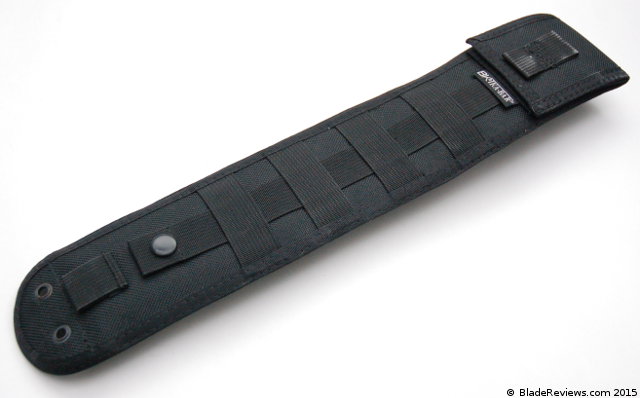
In conclusion, I think the BK-9 sheath is nice, especially given the price and when compared with other fabric sheathes, but it still leaves me pining for kydex. Apparently Ka-Bar is attempting to scratch that itch and has a kydex style sheath for the BK-9 listed for sale on their website. It’s offered for $50.00. There are plenty of after market sheathes also available.
Becker BK-9 Review – Final Thoughts
The BK-9 is another workhorse in the Becker lineup. It strikes that delicate balance between quality, utility, and price. For under $100 you get a substantial and well made knife. The design, materials, fit, and finish are all on point. The sheath is great for a nylon sheath. Ethan Becker has massaged this design thoroughly, and has squeezed out every ounce of performance that he could given the knife’s size and budgetary constraints. Also, the BK-9 is made in the USA. This always brings a twinkle to my eye.
Here is a shot of the BK-9 next to the ESEE Junglas:
That said, for my money I would pay the premium for the ESEE Junglas. The Junglas is just a little bigger and a little badder in every way. I think it’s worth the extra dough. If you buy a BK-9 and then upgrade the scales and sheath, it will cost you as much as a Junglas anyway. However, none of this is said to make light of the BK-9. It is still an excellent knife in it’s own right, and it has developed a loyal following. But I am a huge Junglas fan boy and I know that the “Junglas vs. BK-9” battle has come up many times before. This is simply my opinion.
If you want a tough chopper and are looking to keep things under $100 you can’t go wrong with the Becker BK-9. It gets a lot of things right and it won’t be leaving my collection any time soon.
- Blade Material: 1095 Cro-Van carbon steel for superior edge retention and durability
- Blade Length: 9.25" Bowie-style clip point with flat saber grind
- Finish: Black epoxy powder coat for corrosion resistance and stealth aesthetics
- Handle: Ergonomic Grivory (glass-filled nylon) for a secure, fatigue-reducing grip
- Construction: Full-tang design for maximum strength and reliability
If you would like to buy a Becker BK-9, I recommend buying it at Amazon or BladeHQ. Please consider that buying anything through any of the links on this website helps support BladeReviews.com, and keeps the site going. As always, any and all support is greatly appreciated. Thank you very much.
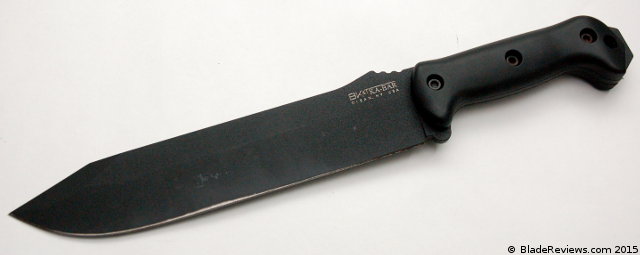
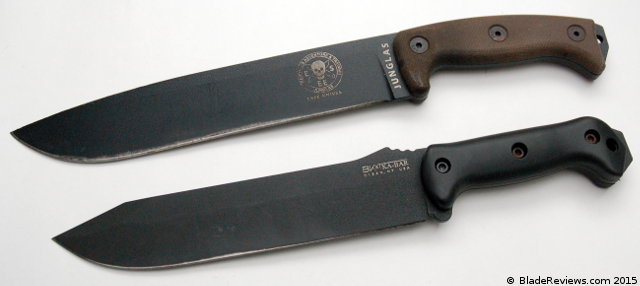
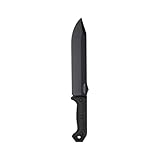
So is the BK-9 and BK-2 to be viewed as affordable alternatives to the ESEE 3 and Junglas?
Andrew,
I would classify the BK-9 as an affordable alternative to the Junglas if you are just going to stick with the stock sheath and handle scales. If you are planning on buying a BK-9, but want to upgrade the handles and sheath, I’d just buy a Junglas, as the total cost will be similar.
The BK-2 is a much bigger, thicker and heavier knife than the ESEE-3. It dwarfs it, and the BK-2 is probably closer to the ESEE-4. The BK-2 is a robust camp knife and I think it’s a great knife for the money, but I would not compare it to the ESEE-3 due to the big difference in size and weight.
Dan
you sound very familiar, with the bk-9.
In the sheath, there is a plastic coated slot, to receive a secondary blade.
Do you know knives are suggested, for the slot?
Malcom, It’s designed for a Becker BK-13 Remora.
Dan
there is a secondary slot for a smaller knife, in the sheath. anyone know what knives this is designed for???
The secondary slot on the sheath is designed to fit the BK13 Remora.